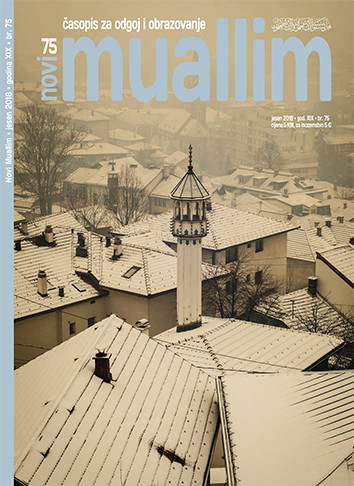GAMBLING DISORDER – WHAT DO WE KNOW OF IT TODAY?
DOI:
https://doi.org/10.26340/muallim.v19i75.1668Keywords:
non-substance related addictions, behavioural addictions, gambling, Bosna i Hercegovina, DSM-5Abstract
UDK 28:179.8
616.89-056.8
Addiction is not limited to “addiction to substances” alone. In the core of the definition of addiction to substances lies the loss of control. Addiction to gambling falls into a category of behavioural disorders or non-substance/ non-chemical related disorders. The concept of behavioural disorder is relatively new and revolutionary concept in psychiatry. Addiction to gambling, earlier considered as pathological or problematic gambling, occurs when control over gambling is lost. The growing evidence suggests that the behavioural disorders are very similar to substance related addictions in many domains, such as phenomenology, comorbidity, genetic underpinning, neurobiological mechanisms and reaction to the treatment. In classification, behavioural addiction was suggested as a new class within DSM-5 and gambling addiction is the only category included. Addiction to the internet games is classified in the appendix as a disorder that requires further studies. Various kinds of excessive behaviour have been recognised as disorders that may lead to addiction, such as gambling, use of computer, video games, internet use, sexual intercourse, pornography, food, exercise and shopping. Age groups that are most likely to develop this type of disorder are those of late childhood and adolescence, at the same time this is the age when behavioural addictions occur in most cases. Prevalence of gambling disorder in the period of adolescence is very high and for certain disorders (especially those related to the use of internet) it tends to grow with time. This article offers a detailed review of gambling disorder, its definition, epidemiology, forms of occurrence, comorbidity, estimations, prospects for treatment and existing forms of treatment.
Downloads
Published
How to Cite
Issue
Section
License
Naknada:
a. Časopis ne naplaćuje naknadu za obradu članaka (APC) i naknadu za podnošenje članaka.
Autori koji objavljuju u ovom časopisu pristaju na sljedeće uvijete:
- Autori zadržavaju autorska prava i pružaju časopisu pravo prvog objavljivanja, pri čemu će rad jednu godinu po objavljivanju biti podložan licenci Creative Commons imenovanje koja omogućuje drugima da dijele rad uz uvijet navođenja autorstva i izvornog objavljivanja u ovom časopisu.
- Autori mogu izraditi zasebne, ugovorne aranžmane za ne-ekskluzivnu distribuciju rada objavljenog u časopisu (npr. postavljanje u institucionalni repozitorij ili objavljivanje u knjizi), uz navođenje da je rad izvorno objavljen u ovom časopisu.


